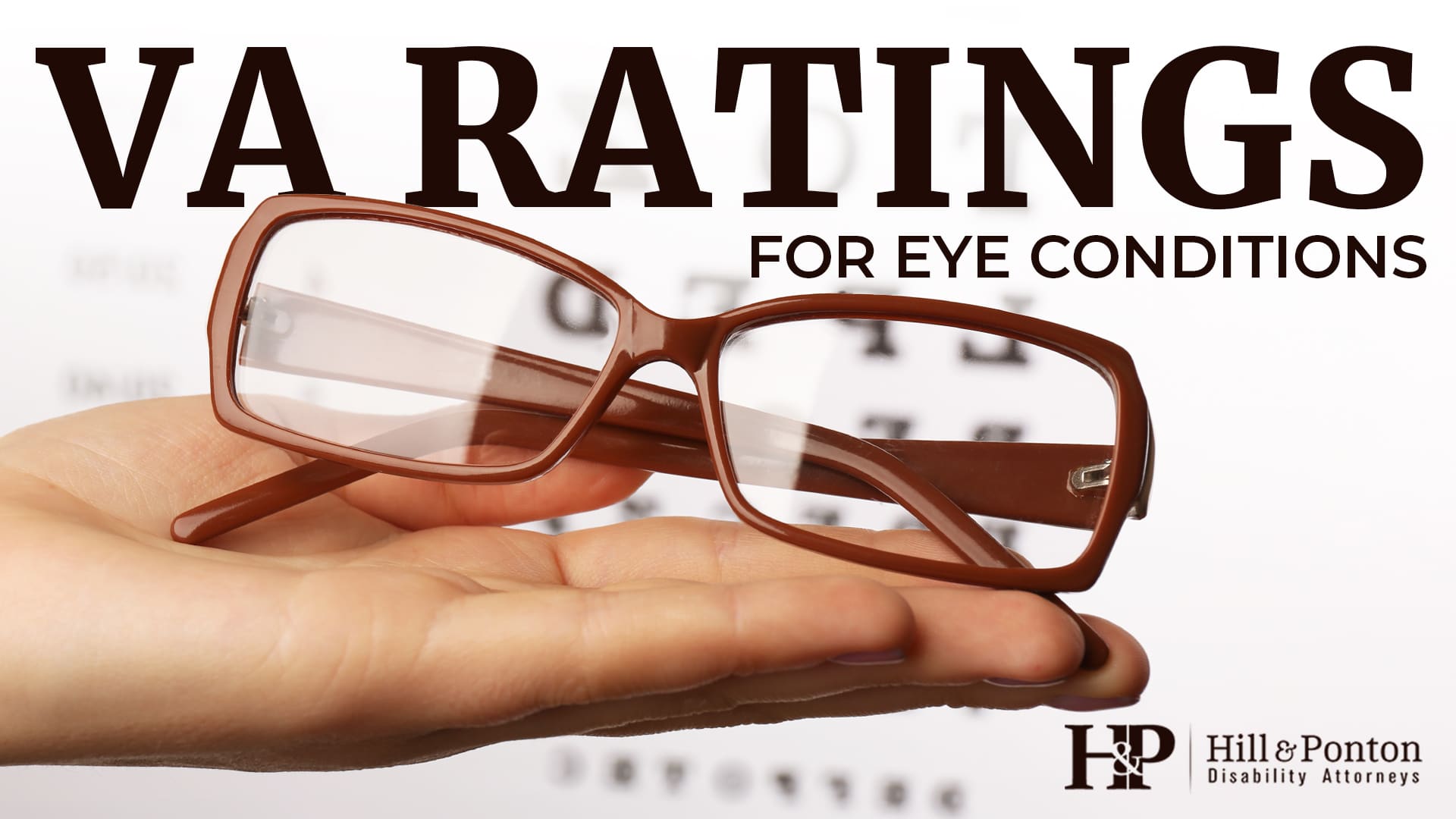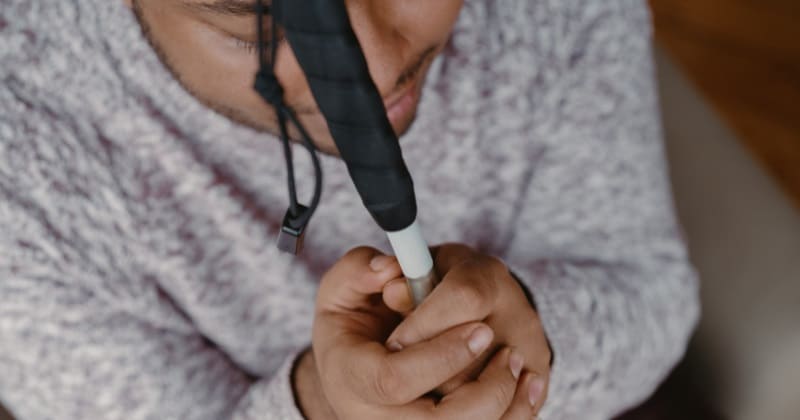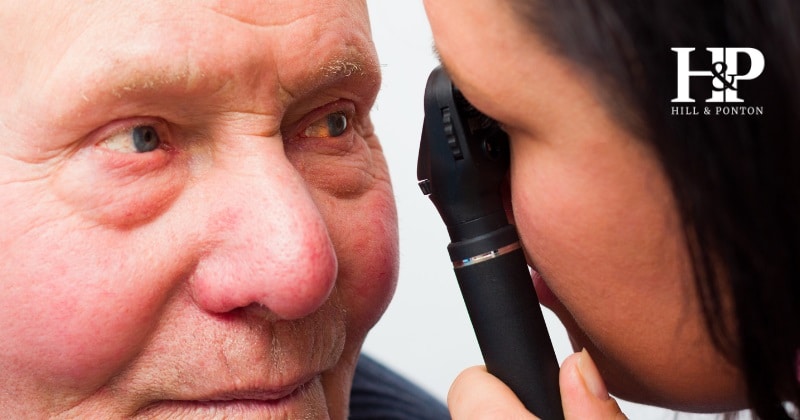Over 250,000 United States veterans are receiving disability compensation through the Department of Veterans Affairs for eye or vision conditions; over 80,000 alone from the Gulf War. Also, 75% of veterans with traumatic brain injuries (TBI) have vision problems, often without even realizing the problems are related to their TBI or getting compensation for the vision condition as secondary to the TBI.
Eye conditions range from injuries, damage from exposures and illnesses or diseases contracted while in service. There are also eye conditions that are secondary to other medical conditions that are eligible for VA disability. The VA Healthcare system also provides eligible veterans with eyeglasses or eye care if they meet certain requirements.
In this blog, we will explore some of the eye conditions that are eligible for disability benefits, how they are rated by the VA for service connection, and what requirements a veteran must meet to get eye care through the VA Health Care system.
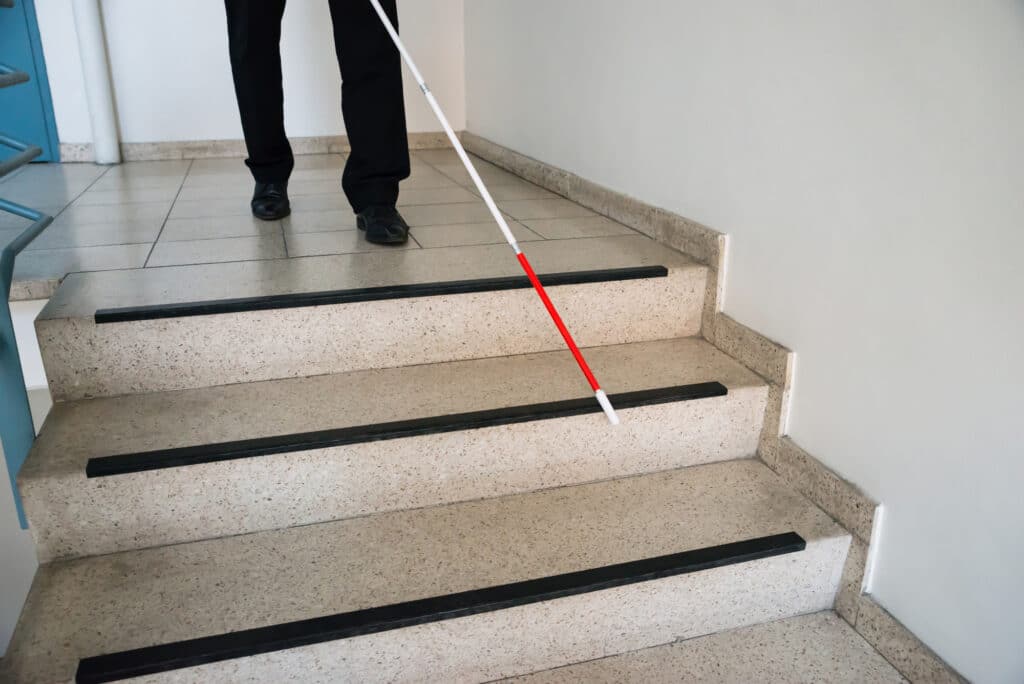
Service Connection for Eye Conditions
The most common eye conditions rated by the VA include visual impairment, blindness in one or both eyes, conjunctivitis, and unhealed injuries. But, there are several others and some are direct service connection disabilities while others are secondary. Whether the condition was caused by an injury, exposure, or illness, the following eye conditions are ratable by the VA:
- Loss of the eye or both eyes
- Loss of the eyelids, eyelashes, or eyebrows
- Lacrimal gland and lid disorders
- Ptosis of either or both eyes
- Conjunctivitis related conditions
- Corneal conditions
- Inflammatory eye conditions or injuries
- Glaucoma
- Cataracts and lens conditions
- Retinal conditions
- Neurologic conditions
- Tumors and neoplasms
- Other eye conditions
An injury to the eye that occurs in service and causes damage to the eye is compensable provided it causes permanent or chronic damage, even if it is only a scar. Acute injuries that are treated and resolved are usually not compensable unless they return or are considered in remission such as cancer. Any illnesses to the eye that manifest during active duty service are also compensable, even if they are not the result of or caused directly by military service. For example, if a veteran is diagnosed with glaucoma while on active duty, or within one year of discharge, it is service connected.
Getting VA Disability for Eye Floaters
Eye floaters are a common visual complaint that aren’t always linked to an eye condition or injury. Floaters appear as lines or dark spots in the field of vision and occur when strands of vitreous fluid clump together. This then casts shadows on the retina.
Some people may have larger quantities of eye floaters in their vision as a result of vitreous detachment. The VA may consider vitreous detachment when rating eye conditions, so be sure to discuss your symptoms with a medical professional. Keep in mind that a sudden increase in floaters could be a sign of a retinal tear or detachment, which require immediate medical attention to prevent vision loss.
Secondary Service Connection for Eye Conditions
Secondary eye conditions are those that are caused by another medical condition or medications used to treat another medical condition but are not directly related to military service or did not actually manifest during active duty. These conditions, as long as they are related to a service-connected condition, are still service connectable as a secondary condition. An example is if a veteran is service connected for diabetes mellitus and develops diabetic retinopathy, the retinopathy is secondary and is eligible for VA compensation. Some medical conditions that can cause secondary vision problems include:
- Diabetes – diabetic retinopathy, glaucoma, and cataracts
- Sarcoidosis – optical neuropathy
- Lyme Disease – retinal vasculitis and optic disc edema
- Cerebrovascular events (stroke) – blind spots
- Thyroid problems – double or blurred vision, protruding eyes
- Multiple Sclerosis – changes in vision, optic neuritis, gradual loss of vision
- Rheumatoid Arthritis – thinning of the cornea
Another example would be if a veteran took a medication and the medication caused eye problems. Some examples are:
- Hydroxychloroquine used as an anti-malaria medication as well as to treat lupus and rheumatoid arthritis can cause ocular toxicity and cause problems with the corneas
- Medications for depression, Parkinson’s disease, seizures, ulcers, asthma, arrhythmia, and hemorrhoids are also linked to glaucoma
- Bisphosphonates (for bone loss) are linked to orbital inflammation, uveitis and scleritis
- Topiramate (Topomax) used for migraine headaches and epilepsy can cause angle-closure glaucoma, usually seen soon after starting treatment
- Tamsulosin (Flomax) can lead to intraoperative floppy iris syndrome
- Erectile dysfunction drugs are linked to ischemic optic neuropathy
- Blood pressure medications, specifically diuretics, can sometimes be linked to worsening glaucoma
- Corticosteroids can lead to cataracts and glaucoma with long-term use
- Drugs for organ and bone marrow transplants such as cyclosporine and tacrolimus can cause posterior reversible encephalopathy syndrome with bilateral vision loss
- Minocycline used to treat acne can cause increased intracranial pressure and papilledema, leading to permanent vision loss
If a veteran is taking any of the above medications, or has in the past, and has the linked eye condition, they need to speak to their optometrist about whether there is a link to the medication and file a claim. There are certain signs that link the medications to the disabling conditions, and a trained optometrist will be able to distinguish the signs.
VA Disability Ratings for Eye Conditions
The VA uses 38 CFR § 4.79 as the schedule for rating disabilities of the eye. There is a general VA disability rating formula, as well as a variety of diagnostic codes that correspond with specific eye diseases for service connection. Under the general rating formula for diseases of the eye, eye conditions are assigned a VA disability rating from 10% to 60%.
- 10%: With documented incapacitating episodes requiring at least 1 but less than 3 treatment visits for an eye condition during the past 12 months
- 20%: With documented incapacitating episodes requiring at least 3 but less than 5 treatment visits for an eye condition during the past 12 months
- 40%: With documented incapacitating episodes requiring at least 5 but less than 7 treatment visits for an eye condition during the past 12 months
- 60%: With documented incapacitating episodes requiring 7 or more treatment visits for an eye condition during the past 12 months
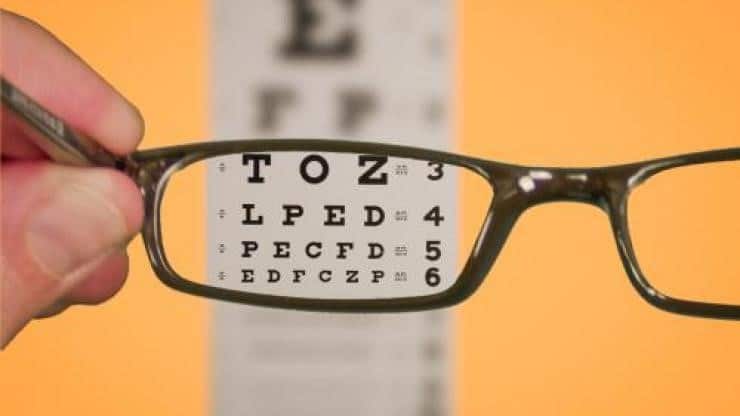
How VA Measures Eye Diseases and Decides on Ratings
Diseases of the eye are rated by the VA based on three main measurements; central visual acuity, visual field, and muscle function.
- Central Visual Acuity: this is how focused or blurry images are at specific distances. This is often tested with the eye chart we are all so familiar with to detect decreased visual acuity. The central visual acuity measurements go from 20/20 to 5/200 and the VA rates the veteran for VA disability benefits based on corrected vision, if it can be corrected. Anything worse than 5/200 is considered legally blind. The VA rates both eyes together, so if a veteran is blind in one eye and has 20/20 in the other, they would likely receive a 40% rating.
- Visual Field: This is a measurement of the area that the eye sees. Often eye exams have a chart included with 16 meridians for each eye moving outward from the center. This measures the field of vision and, while complicated to measure, it can be compensable. This will show if there is peripheral vision loss, upper vision or lower vision loss, central vision loss, etc.
- Muscle Dysfunction: This measures how well the muscles of the eye move and is measured on the same type of chart as the visual field. The example to the right shows the measurement field of an eye whose muscle function limits upward and downward vision but is able to move side to side.
Once an optometrist has gathered all of these measurements, they are able to rate the eye condition using scales that combine all three measurements for both eyes. Each eye receives its own percent rating, so if a veteran was blind in one eye and had good vision in the other, they would not be rated 100% in one eye and 0% in the other, it would be a combination of both eyes. Only an optometrist is able to measure eye conditions, and there is a disability benefits questionnaire a veteran can take to his or her optometrist to fill out if filing a claim. While not a perfect claim, it can give the optometrist an idea of what the VA is looking for and how they rate eye conditions. If filing a claim, the VA will also schedule a C&P exam at the nearest VA center for the veteran.
Additional Eye Benefits

Those with accessibility issues may also be eligible for Special Monthly Compensation for their vision loss. Special monthly compensation is typically seen for veterans struggling being housebound, or have loss of an organ (eyes), aid and attendance (home help), and even home health care. Another assistance is such things as alterations to a veteran’s home for accessibility, mobility aids, service animals, and unemployability compensation.
The VA Healthcare system also offers routine eye care to all veterans. Veterans with a service-connected disability, former POWs, Purple Heart recipients, those with an increased pension based on A&A, significant functional or cognitive impairments, or whose vision impairment is so severe it interferes with their ability to participate in their own medical care are eligible for eyeglasses. Check here for eligibility requirements.
Get Help with Your VA Claim
Your vision is important to your independence, make sure you take care of it and get compensated properly if it is impaired. If you’re a disabled veteran seeking benefits for an eye condition, and the VA either denied your claim or awarded a lower percent rating than expected, the team at Hill & Ponton is here to help. Our attorneys can assess your disability claim and entitlement to VA benefits. Contact our law firm today for a free case evaluation.
